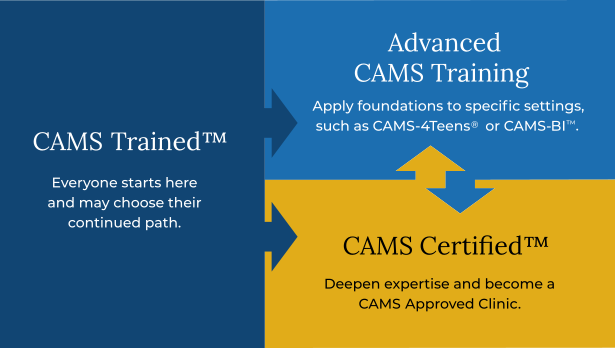Help save lives by providing an evidence-based suicide treatment solution to military and veterans with CAMS, the Collaborative Assessment and Management of Suicidality.
Training is available for:
- Clinical directors
- Training directors
- Graduate students under supervision
How CAMS Training Supports Suicide Prevention in the Military
Veterans suicide prevention training is essential—military veterans in the U.S. have higher rates of suicide than the general population.1 In 2022, suicide was found to be the 2nd leading cause of death for Veterans under the age of 45.2 A study from 2014–2019 also found that soldiers in the U.S. are more likely to die by suicide than by any other cause.3 It’s crucial that this population gets the help they deserve. CAMS can offer immediate help and lasting recovery.
How CAMS Can Help
CAMS is an evidence-based framework. It focuses on suicide prevention. This framework helps clinicians accurately assess suicide risk. Additionally, it provides a clear path for effective suicide-focused treatment. It has been found to resolve suicidal ideation in as few as 6–8 one-hour sessions. Clinical trial research shows that CAMS is highly effective for suicide prevention in the military, helping eliminate suicidal ideation in U.S. Army Soldiers. Currently, over 30 military treatment facilities (MTF’s) across the U.S. have been trained in CAMS. CAMS training has been conducted across 8 VA Medical Centers that make up VISN-7. Additionally, it has been implemented at over 20 other VA Medical Centers and outpatient settings.
Benefits of CAMS for Military and Veterans
Effective Right Away
CAMS engages individuals immediately. It helps them identify patient-identified suicidal “drivers.” Additionally, it equips them with a treatment plan. This plan helps stabilize their feelings and increases their ability to manage suicide thoughts effectively. This means that even with a limited number of sessions, it can leave a lasting and life-changing impact.
Cost-Effective Solution
Training your clinical staff in CAMS is cost effective and efficient. It provides patients with a treatment plan to keep them moving forward with care.
Reduces Malpractice Risk
CAMS can significantly reduce the risk of malpractice due to its use of the Suicide Status Form which provides protective documentation of suicide-focused assessment and treatment. This can help staff feel more confident and comfortable when using it to care for patients.
A Clear Path Forward
Recovery is always the end goal. Training the staff in suicide prevention with CAMS is a valuable step. It helps military members and veterans find a clear and direct path for treatment and recover from suicidal suffering. It can also help them open the door to a life worth living.
How CAMS Training Works
CAMS-care offers clinical suicide treatment training that is cost effective, adaptable, and backed by extensive research. We recommend that providers first become CAMS Trained™. After receiving the CAMS Trained designation, you and your team can enroll in Advanced CAMS training programs that take your CAMS knowledge further.
CAMS Brief Intervention (CAMS-BI™) is an intervention specifically designed to be used for crisis stabilization. When using CAMS-BI, you help set patients up for success by providing a therapeutic assessment and creating a personalized treatment plan and referral for outpatient care. These shorter, one-hour consultations have immediate impact—with 58% of patients reporting reduced distress and increased motivation to live. CAMS-4Teens® is an advanced training that can be helpful when working with family members of military and veterans. It focuses on applying the CAMS Framework® to at-risk young people and their families.

CVN has had the pleasure of working with the CAMS-Care organization for several years to implement training on the CAMS Framework for our network of clinical staff. Our clinicians have routinely reported that training on the CAMS Framework enhanced their professional expertise and that they would recommend the training to others. As we at CVN recognize the importance of equipping our clinicians with skills to work effectively with clients at elevated risk for suicide, we see CAMS as a valuable component of our suicide prevention approach. The CAMS-Care team has also been very easy to work with and has consistently supported our network.
Ava Weiss
Senior Training Manager
Cohen Veterans Network
Frequently Asked Questions
CAMS Veterans & Military Suicide Prevention Training equips clinicians and behavioral health providers serving active duty personnel, veterans, and their families with the CAMS Framework®. This evidence-based approach helps providers assess suicide risk, engage service members in collaborative safety planning, and address the underlying drivers of suicidality.
Suicide remains one of the leading causes of death among service members and veterans, often linked to stress, trauma, and transition challenges. Prevention training is critical to protect lives, support readiness, and ensure those who serve have access to effective, compassionate care.
The U.S. Army requires suicide prevention training under AR 600-92, which establishes policies and responsibilities for all soldiers and Department of the Army civilians. The regulation emphasizes awareness, intervention skills, and referral to professional resources as part of a comprehensive strategy.
CAMS provides a structured, collaborative method for engaging service members in care. By focusing on the individual’s own experience and building personalized safety plans, CAMS helps military providers move beyond observation to meaningful intervention that can reduce suicidal thoughts and improve mission readiness.
The standard CAMS Trained™ program involves about 10 hours of online coursework and 4 hours of consultation calls, allowing most providers to complete training in roughly 30 days. This timeline makes it accessible for busy military and VA clinicians while ensuring readiness to apply CAMS effectively in practice.